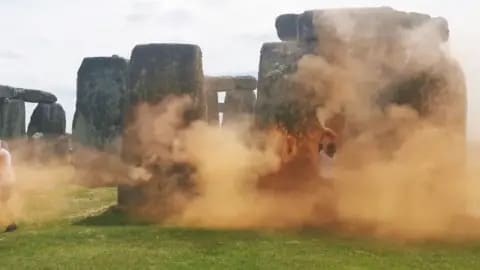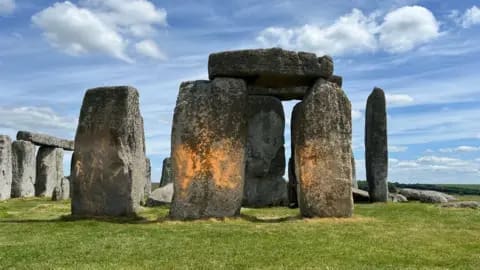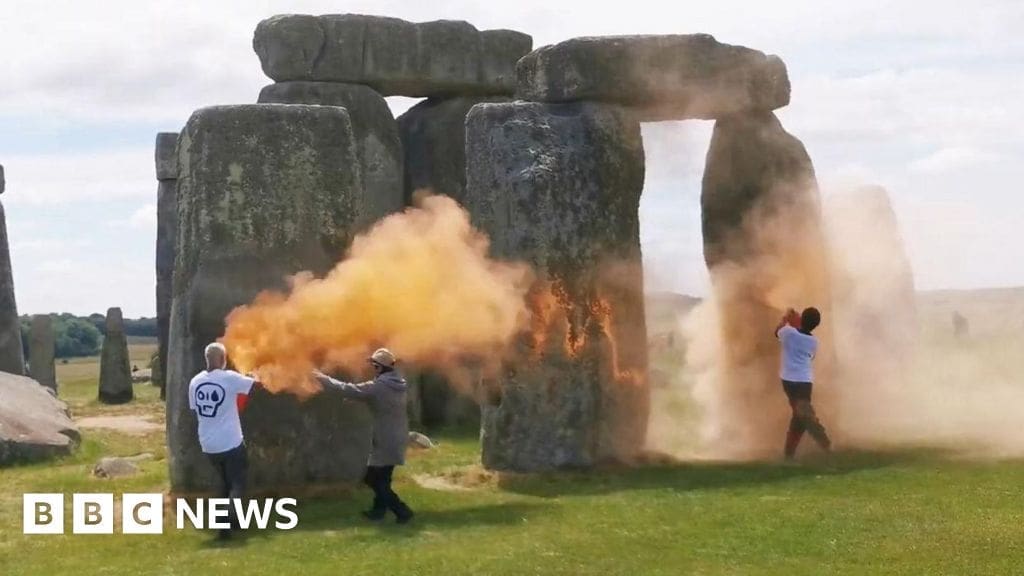Part of Stonehenge has been covered in orange powder paint by protesters.
Two Just Stop Oil campaigners sprayed the powder paint on the historic site near Salisbury, Wiltshire, at about 12:00 BST on Wednesday.
The move comes the day before celebrations begin for the Summer Solstice at the 5,000-year-old landmark.
Wiltshire Police confirmed two people had been arrested on suspicion of damaging the ancient monument.
Just Stop Oil said the orange powder paint was cornflour and it would “wash away with rain”.
The group named the two protesters as Niamh Lynch, a 21-year-old student from Oxford, and Rajan Naidu, a 73-year-old from Birmingham, in a statement.
‘Extremely upsetting’
Prime Minister Rishi Sunak condemned the incident as a “disgraceful act of vandalism”.
Leader of the Labour Party Sir Keir Starmer said the damage was “outrageous” and described Just Stop Oil as “pathetic”.
Members of the public were heard shouting “no” and seen running to intervene as the campaigners ran up to the stone circle at the Unesco world heritage site.
A spokeswoman for English Heritage described the spraying of the monument as “extremely upsetting” and confirmed the site remained open to the public.

She added that curators were “investigating the extent of the damage”.
BBC correspondent, Paul Clifton, the first reporter to get to the scene shortly after the incident, said the three stones closest to the public path were “splattered” with the powder.
He added that many of the tourists visiting the monument were “slightly bemused”.
“Stonehenge managers and security guards are standing by the path,” he said.
“I’ve heard a suggestion that because it is powder paint and the weather is dry and sunny, it may perhaps be removed without lasting damage, but they will need experts to inspect the stone before forming an opinion.”
Just Stop Oil said the motivation behind the incident was to demand the next UK government end the extraction and burning of oil, gas and coal by 2030.
A spokesperson for the group said: “Continuing to burn coal, oil and gas will result in the death of millions.
“We have to come together to defend humanity or we risk everything.”

Mike Pitts, archaeologist and author of How to Build Stonehenge, said the incident was “potentially quite concerning”.
He said: “The monument has been fenced off for decades and the megaliths’ surfaces are protected.
“They are sensitive and they are completely covered in prehistoric markings which remain to be fully studied and any surface damage to the stones is hugely concerning.
“A rich garden of life has grow on the megaliths, an exceptional lichen garden has grown. So it’s potentially quite concerning.”
A spokesman for Wiltshire Police said: “We responded to a report that orange paint had been sprayed on some of the stones by two suspects.
“Our enquiries are ongoing and we are working closely with English Heritage.”
Source: www.bbc.com








